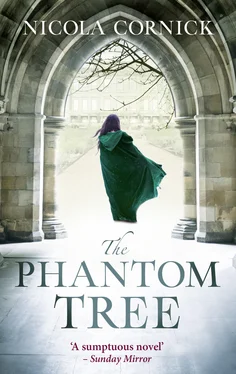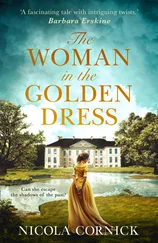My name is Mary Seymour. I was born at Sudeley Castle but have no recollection of my nursery there, hung with red and gold, for almost as soon as I came into the world my mother left it. I’m told that my father had never anticipated that she might die in childbirth, which is odd since it is a common danger, particularly for a woman such as my mother Katherine Parr who was past the age when it was wise to have a first child or indeed perhaps a child at all. But she was giddy for love of him and he was giddy for love of himself so I imagine they gave little thought to the consequences of their infatuation.
I was born. My mother died. My father professed himself to be so stunned by grief that he could not think straight. However he knew enough to realise he did not want the burden of a baby daughter, so he took me to London and abandoned me in the nursery of my aunt and uncle, the Duke and Duchess of Somerset, where I might have cousins with whom to grow up. It was a good plan, if a self-interested one, and it might well have turned out quite differently had it not been for his overweening ambition, which toppled over into treason.
My earliest memory was of being unwanted.
‘What is to become of the Lady Mary?’ My governess, Mistress Aiglonby was the only one who, in the chaotic aftermath of my father’s arrest for treason, pressed for my family to continue to care for me. I can still hear the wail of her voice rising above the sound of my belongings being packed away into boxes. I had no real sense of what was happening. I remember tipping my set of skittles out of the box again, spilling them all over the floor and tripping the nursemaid up as she ran about trying to fold my clothes into a bag that was too small. She was red of face and flustered, and looked near to tears.
‘Lady Mary cannot stay here.’ It was my aunt, the duchess, who spoke. She had no warmth in her, least of all towards me.
‘I agree it would be difficult to explain to her in the future that her uncle signed her father’s death warrant.’ Dearest Liz Aiglonby. She could be tart when she chose. She had been one of my mother’s maids before she became my governess. Her family were ambitious for preferment at court but that did not prevent her from defending me like a lioness.
‘That was not my point.’ The duchess’s tone had chilled still further. ‘Let her mother’s kin take her in.’
‘The Parrs do not want her.’
No one wants her .
My skittles had been a present from my father. They were carved into the shape of men, painted to look like sailors. I took one in my fist and neatly struck off the head of another with it. Or so I am told. In truth, I probably remember nothing of this, being too young, although it feels as though the memory is real.
‘Lord Seymour suggested her grace of Suffolk…’ Mistress Aiglonby sounded hesitant now and my aunt gave a brusque bark of laughter.
‘Why would he do that? I thought he liked her?’ Her voice changed. Malice rang clear as a bell. ‘Mayhap the rumours are true and she did refuse him and this is his revenge.’
‘Her grace was a close friend of the late Queen.’
‘Which does not mean she would wish to be saddled with her penniless child.’
Yet to the Duchess of Suffolk I was sent, like an unwelcome gift, trailing my retinue of nursemaids, rockers, laundresses and servants.
Lady Suffolk was renowned for her piety but this did not mean she possessed generosity of spirit as well.
‘The late Queen’s child is too expensive for me to keep,’ she told anyone who would listen, but no one was listening, not really, not even parliament, which eventually restored to me all that was left of my father’s property. This was practically nothing. So my expensive household was dismissed but for a few servants, and Lady Suffolk sent me to her castle at Grimsthorpe in Lincolnshire since I could live more cheaply in the country than in London.
I loved Grimsthorpe. The castle had been neglected since the visit of the old king Henry some ten years before and its rooms smelled of stale air and damp and secrets. There were locked doors and tumbledown walls, rambling gardens and endless woods under wide blue skies. Best of all, no one cared what I did so no one interfered. One of Liz’s brothers came to tutor me sometimes, and Liz herself tried to instil in me the skills and lessons appropriate to a lady, but I was a stubborn child and had no interest in learning. I think that the Duchess of Suffolk might have tried to betroth me young had I even the smallest dowry but as I had nothing but notoriety she knew no one would want to wed me.
How long my idyllic life at Grimsthorpe might have continued I do not know, for when I was eight years old the duchess and her fierce Protestantism fell foul of the Bishop of Winchester and she vowed to leave England for fear of persecution. There was no question that she would take me abroad with her. For a couple of years, I was shunted from pillar to post, from London to the country, from north to south, from court to church and back again. I was a nuisance. Queen Mary declared that I should be sent to one of my father’s manors. Liz Aiglonby staunchly maintained I was too young, that I was the Queen’s ward and her responsibility. Mary said dryly that as the Seymours had begat me so to the Seymours I should go.
My uncle Somerset had followed my father to the executioner’s block, so it was left to my cousin Edward, as head of the family, to provide for me. He and I were united in disgrace, the Seymours fallen further than they had ever risen.
It was then I first heard the whisper of that name:
Wolf Hall.
My first sight of the place was on a day of bright sunlight, but once we were within the forest of Savernake the sun vanished into darkness and the track seemed interminable and lonely. It felt as though we were arriving at the end of the world.
‘What sort of a name is Wolf Hall?’ Liz asked, as she placed my clothes in the big bound chest in the chamber I was to share with my cousin Alison. We had been welcomed warmly enough on arrival with bread, a little butter and some fruit although it was closer to dinner than breakfast time. Dame Margery, the housekeeper, had then shown us to my bedchamber and had vanished, although Cousin Alison had remained. She sat in the window where the pale light seemed to shimmer on her flaxen hair. I had never seen anything so pretty in my life.
Liz sounded suspicious, I thought, as though she expected a wolf to appear from behind a tree and gobble her whole. She disliked the country and thought its inhabitants unruly and unpredictable, whether human, feathered or furred. Nor did she like Wolf Hall itself. The rambling old manor was even more run down than Grimsthorpe had been and here I was less than no one and Liz, consequently, nothing at all for all her London connections and service to the court.
‘Wolf Hall is nothing to do with wolves,’ Alison said. She sounded faintly patronising. ‘It comes from the ancient Saxon name for the estate.’
‘Saxon!’ Liz said. Her family had come over with the Norman King William. Her sniff of disdain left no room for doubt that she considered the Saxons even more barbaric than the present inhabitants of Savernake Forest.
Alison smiled, tossing her golden plait over her shoulder. She looked very Saxon herself with her cream and roses complexion and her blue eyes. There was a look of the late Queen Jane about her, or so I was told. Except that Queen Jane was pious and demure and Alison was never that.
Alison and I were only distantly related, but at Wolf Hall, I had already discovered that we Seymours were all jumbled up together, called cousins regardless of our relationships, abandoned here because there was nowhere else for the sprawling offshoots of the family to go. There were half a dozen of us children and I never worked out how we were connected other than through rejection or loss. There were two babies in the nursery; whose they were I never discovered. Closest in age to me was a boy of seven, but from the lofty heights of ten years, I considered him negligible. Then there was Alison, two or three years older, and above her in the pecking order a sullen youth who boasted that he was soon to be sent away as squire in a knight’s household.
Читать дальше












